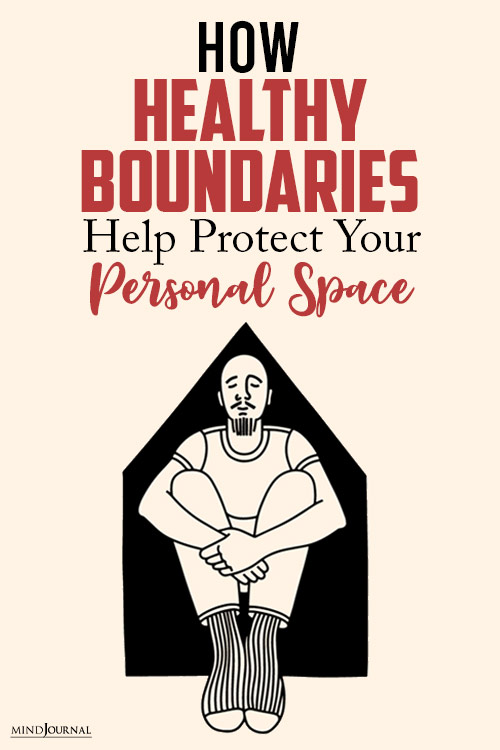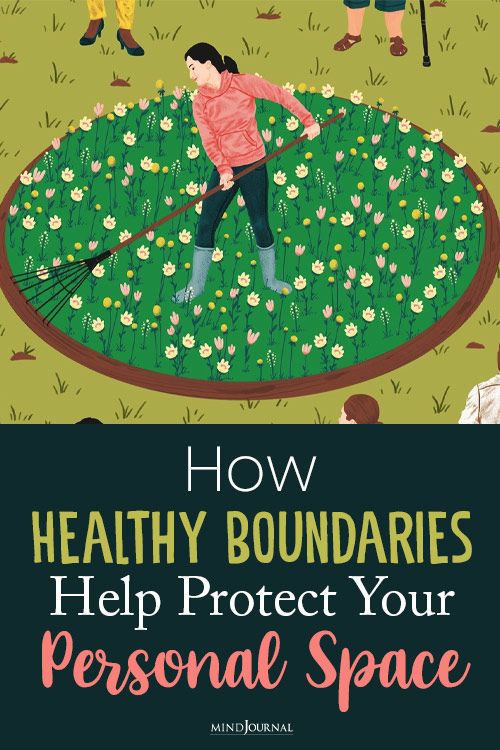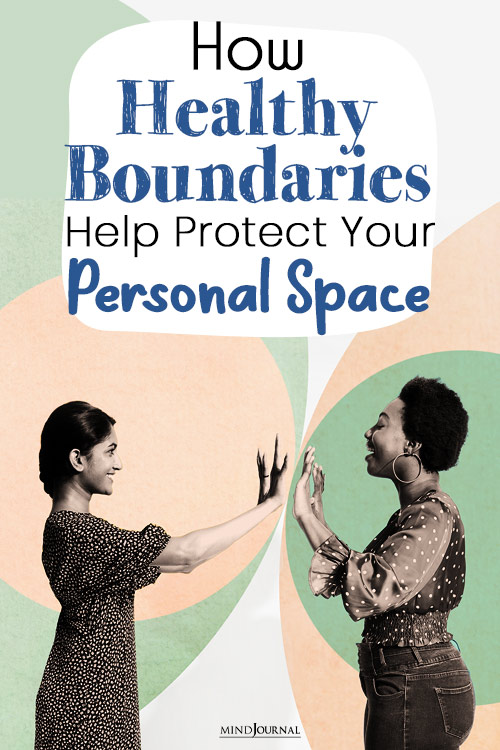Personal boundaries are like an invisible “no trespassing” sign that helps to create your personal, emotional, and mental space. Healthy boundaries are crucial for our safety, health, and wellbeing.
What is a personal boundary?
A boundary is a personal and practical limit that defines you and protects you. It also determines how much you allow others to enter your life and how much you expand your sense of self when it comes to relationships. Establishing personal boundaries is important for your mental and emotional well-being.

Every relationship needs some personal space that allows you to be yourself and protect your integrity. However, often certain people can invade our personal space and push us to our limits. These people believe that they are entitled to do so and their needs are far more important than ours.
Your boundaries represent your identity, limits, values, principles, and expectations that you have developed to protect yourself physically, mentally and emotionally. Healthy boundaries allow us to be our most authentic selves. It is a form of communication that establishes who we are, what we stand for, and what we will or won’t tolerate.
Healthy boundaries help us to define our personal beliefs, values, and limits. It is an invincible border where others are not allowed to enter without our permission. This border protects our mental and emotional well-being and ensures that we are not personally affected by others’ actions and behaviors. Boundaries inform others about how much they can approach you or how they may treat you. It gives you a sense of control over your own volitional actions, emotions, body and physical space. In essence, boundaries communicate our limits.
Related: Setting Personal Boundaries To Protect Your Mental Health
Setting healthy boundaries

“Healthy boundaries are a crucial component of self-care,” adds Joaquín Selva, Bc.S. Respecting the boundaries of others and setting boundaries for yourself is very important for healthy relationships and stable mental and emotional wellbeing. However, it can often be easier said than done.
Whether you want to be more assertive at work or establish healthy boundaries with your spouse or family members, you must set healthy rules and communicate your boundaries to navigate through relationships.
In life, we can choose to set boundaries for the following:
- Our personal space
- Our thoughts
- Our emotions
- Our sexuality
- Our material possessions
- Our time, effort and energy
- Our ethical, cultural, political and religious beliefs
Before you set your personal boundaries, you need to determine exactly what you want to protect the most and set your priorities. Although you should set healthy boundaries for every aspect of your life, prioritizing them will help you determine where you want to be strict and where you can be flexible.
Related: 5 Steps To Better Emotional Boundaries
There are 3 major kinds of personal boundaries:
1. Mental Boundaries
These include your knowledge, wisdom, thoughts, principles, and values. These are usually difficult to explain or clarify to others as they are intangible.
2. Emotional Boundaries
These include your emotions, feelings, sentiments, reactions, responses, and spirit. These are also intangible and need to be felt instead of being defined.
3. Physical Boundaries
These include your physical body and how much others are permitted to physically contact you through handshake, touch, caress, hugs, kisses, etc. These are the rules that establish your personal space.
When you are setting boundaries, you need to understand that they are often greatly influenced by our family, culture, background, environment, region, personality, family dynamics, and life experiences. There are a lot of factors at play here and you need to consider and honor all of them if you wish to set healthy personal boundaries.
However, these boundaries may be different for each of us as we all have unique childhood experiences, relationships, and personalities. Our boundaries may also change over time as we gain more experience in life, become mature and have changes in our perspectives.
Healthy boundaries are not walls
Just because you are setting personal boundaries, it doesn’t mean you will isolate yourself and keep everyone away from you. When your boundaries become too strong, inflexible or rigid, it can lead to problems. Healthy boundaries need to be flexible yet firm. It should not build a wall around you to avoid closeness. You need to reassess and update your boundaries occasionally. However, it should not be too flexible either. You need to find the perfect balance when setting healthy boundaries. When you become excessively self-sacrificing in any relationship, it paves the way for exploitation, abuse, or imbalance.
The purpose of establishing healthy boundaries is to allow others into your life while asking them to respect your personal space, beliefs, values, and limits. By communicating your boundaries clearly, you help others understand how they need to treat you, what is acceptable to you and how they can make you comfortable to be closer to you.
It is obvious that a stranger or a new friend might not be aware of your personal boundaries just like you might be oblivious to theirs. Hence, communicating your values and beliefs is a crucial step to creating healthy boundaries. Boundaries are a sign of respect and responsibility. It shows that you not only respect others, but respect yourself, your skills, your time, and your efforts. It shows where someone else ends and you begin.
Related: 5 Quotes to Strengthen Boundaries Against Toxic People
What healthy boundaries look like?
Psychologist and coach Dana Gionta, Ph.D. says having healthy personal boundaries refers to “knowing and understanding what your limits are.”
Having healthy personal boundaries refers to identifying and understanding your own limits. However, the question remains, “What do healthy boundaries look like?” Here’s how you might feel when you have healthy personal boundaries based on your mental, emotional and physical needs:
- You clearly understand your needs, wants and desires and successfully communicate them to others in relationships
- You refuse to accept disrespect and abuse
- You feel free to say ‘yes’ or ‘no’ when you feel like it and easily accept it when others say it to you
- You are responsible, dedicated and determined to discover and achieve your fullest potential
- You have a strong sense of self-respect and self-identity
- You feel responsible for your own success, failures, happiness and sorrow
- You can easily choose to share power and responsibility
- You expect your relationships to be reciprocal and mutual
- You never compromise your beliefs, integrity or values to gain attention or avoid rejection
- You have no problem asking for help when needed
- You understand your own limits and don’t allow others to define the limits for you
- You respect your own feelings and opinions as well as others
- You gradually share intimate information in a trusting and mutual sharing relationship
- You can identify when it’s your problem and when it’s not
The secret to setting healthy boundaries
Learn to say no. If you want to set healthy boundaries and want others to respect them, then you need to learn how to say ‘no’ to people. Saying ‘no’ is not easy most of the time, especially when you have to say it to your family members or your managers at work. However, you need to know how to be assertive yet respectable. You also need to realize that you can’t help and rescue everyone around you.
When you are trying to be a savior or fix someone, you are simply seeking validation, attention or love. Unfortunately, all your efforts to fix someone will go down the drain as they themselves are not interested to change or become “better” than what they are right now. Everyone is responsible for themselves. It is not your job to save everyone and fix their problems. Let people fail as that’s the only way they can learn. Unless you learn to say ‘no’ to others, you will never be able to set healthy boundaries. You are not responsible for making people happy. You are only responsible for treating others with respect, kindness, and love.
Saying ‘no’ to someone may require some courage on your part but it is often necessary. It is only by saying ‘no’ to others, you can say ‘yes’ to yourself. Most of the time, setting personal boundaries can start by saying a simple ‘no’.
Related: Tips to Cope with Personal Space Intruders
5 steps to set healthy boundaries
If you struggle with setting boundaries, then here are a few steps to help you get started and build strong healthy boundaries for yourself.
1. Know your rights
Establishing boundaries is part of your basic human rights. Psychotherapist and mental health author Dr. Judith Belmont says “It is important in setting boundaries to identify your basic human rights.” When you know your rights, you will realize saying “no” is not a crime. Your rights should be considered first and foremost when setting boundaries.
2. Listen to yourself
Listen to your mind, body, heart, and soul. If you find a person is violating your rights and personal space, then you need to speak up and take a stand. Every time you feel unsafe around certain people in a specific situation, then try to safely get yourself out of that space.
3. Understand your values
Identifying your own personal values can significantly help you in establishing your personal boundaries. Your values can prevent you from giving into distractions and help you decide what kind of behavior is acceptable or unacceptable.
4. Identify what you must change
After you have defined your rights and values, define what specific changes you need to bring about to maintain your boundaries. Identify the boundaries that are being violated and take steps to communicate what changes you require from the other person. You can ask them to respect your boundaries.
5. Talk about it
Whenever you are entering a new relationship, whether personal or professional, it is important that you communicate your healthy boundaries early on. Discuss your personal boundaries with the other person kindly and respectfully.
Boundary equals self-love
Healthy boundaries create healthy relationships. Boundaries not only strengthen our relationships, but it also protects us from toxic behavior and abuse. Personal boundaries protect our sense of self-worth and self-respect. It is a step towards self-care and self-love. Establishing healthy boundaries is a crucial element of self-care and mental well-being.
Related: Personal Boundaries: 9 Core Boundaries To Live By
Psychologist Joaquín Selva, Bc.S. concludes “Setting healthy boundaries is a crucial part of life and an important aspect of any self-care practice. Someone who’s not used to setting boundaries might feel guilty or selfish when they first start out, but setting boundaries is necessary for mental health and well-being.”
Here’s an interesting video that you may find helpful:













Leave a Reply